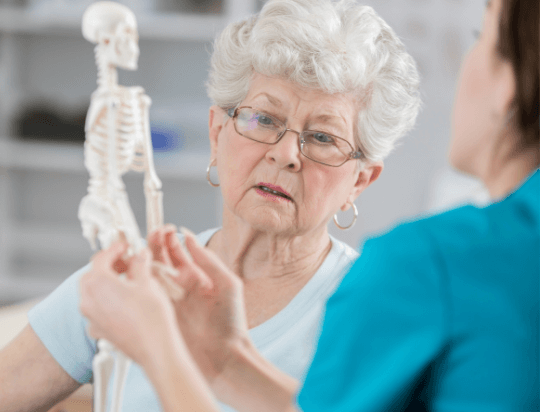What Kind of Doctor Treats Osteoporosis in Indiana?
Osteoporosis is a condition that gradually weakens bones, making them more susceptible to fractures. It affects millions of Americans, often without any warning signs until a bone break occurs. If you’re concerned about osteoporosis, understanding who to turn to for treatment is crucial, as managing this condition effectively can prevent serious injuries, such as fractures in the hip, knee, and shoulder, which can significantly impact your mobility and quality of life.
At OSMC, our team of orthopedic specialists is dedicated to managing and treating osteoporosis. These specialists focus on the musculoskeletal system, which includes bones, joints, muscles, and ligaments. They are uniquely equipped to diagnose osteoporosis through bone density screenings, such as DXA scans, which help detect bone loss early, even before fractures happen.
Comprehensive Care for Bone Health With OSMC
Once osteoporosis is identified, an orthopedic specialist at OSMC will create a personalized treatment plan tailored to your needs. This plan may include:
- Medications: To slow bone loss and, in some cases, help rebuild bone.
- Lifestyle Recommendations: Including weight-bearing exercises that strengthen bones.
- Nutritional Guidance: Ensuring adequate intake of calcium and Vitamin D to support bone health.
- Physical Therapy: Working with a physical or occupational therapist can help you prevent falls, retain muscle mass, and gain strength.
Orthopedic doctors are particularly skilled in treating conditions like osteoporosis because they understand the complexities of bone health. Their expertise extends beyond just treating osteoporosis; they also provide comprehensive care aimed at reducing your risk of fractures, particularly in vulnerable areas such as the hips, knees, and shoulders.
Addressing the Risks of Falls and Fractures
Osteoporosis increases the risk of fractures, which are often caused by falls. The most common injuries associated with osteoporosis-related falls include:
- Hip Fractures: A serious consequence of osteoporosis, hip fractures can lead to a loss of independence and require extensive rehabilitation. In some cases, surgery may be necessary to repair the fracture, and recovery can be lengthy.
- Knee Injuries: Osteoporosis can also weaken the bones around the knee joint, making it more prone to fractures during a fall. Knee fractures can be particularly debilitating, often requiring surgical intervention and physical therapy.
- Shoulder Injuries: The bones in the shoulder are also at risk. A fall can lead to fractures in the upper arm or shoulder or other shoulder injuries, which may require surgical repair and rehabilitation to restore function.
In addition to treating these injuries, orthopedic specialists at OSMC focus on fall prevention strategies. These include:
- Balance Training: Exercises to improve stability and prevent falls.
- Home Safety Assessments: Recommendations to reduce fall hazards in your living environment.
- Assistive Devices: Guidance on the use of canes, walkers, or other devices that can help prevent falls.
Collaborating with Endocrinologists for Optimal Care
In addition to orthopedic specialists, endocrinologists are also frequently involved in treating osteoporosis. Endocrinologists specialize in hormone-related conditions, and because hormones play a significant role in bone health, they can address underlying hormonal issues that might contribute to bone loss. Working together, orthopedic specialists and endocrinologists provide a well-rounded approach to managing osteoporosis, ensuring all aspects of bone health are addressed.
Recognizing the Signs and Taking Action
Osteoporosis is especially prevalent in adults over 50, with women being at a higher risk than men. Factors like family history, certain medical conditions, long-term use of steroid medications, smoking, excessive alcohol consumption, and deficiencies in calcium and Vitamin D also increase the risk.
Even though osteoporosis may not show symptoms initially, maintaining bone health is essential. At OSMC, our orthopedic specialists can guide you on the steps you can take to prevent or slow the progression of osteoporosis. This includes recommending weight-bearing exercises, ensuring adequate intake of calcium and Vitamin D, and providing lifestyle counseling to support bone health.
If you notice a decrease in height, curvature in your spine, or experience sudden pain in your hip, knee, or shoulder after a fall, these could be signs of a fracture due to osteoporosis. It’s important to consult an orthopedic specialist if you experience these symptoms or if you are at risk. Early detection and proactive management are key to preventing the severe consequences of osteoporosis.
OSMC is Committed to Your Bone and Joint Health
At OSMC, we are committed to being your partner in building and maintaining strong bones, ensuring you can enjoy life with mobility and independence.
For more information or to schedule an appointment, contact us at OSMC. We serve patients across Michiana, Northern Indiana, and Southwest Michigan, with several convenient locations to support your bone health needs. Book an appointment online or find an OSMC location near you.

.


